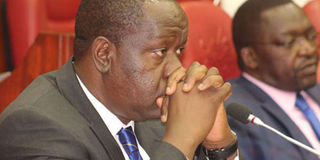Huge workforce killing varsity

Education Cabinet Secretary Fred Matiang'i appears before the National Assembly's education committee at County Hall on October 18, 2016. Technical University of Kenya wants the Ministry's assistance in solving its woes. PHOTO | DENNIS ONSONGO | NATION MEDIA GROUP
What you need to know:
- The university is also said to have rented office space for the Council chairman in Upper Hill at a cost of Sh500,000 a month, despite its financial woes.
- Mr Kanyadudi said that although the government approved the staffing decision in December 2009, the tragedy is that it did not give enough money to cover it.
When the government decided to upgrade one of its anchor technical colleges to a university in July 2009, it opened doors to a hiring spree that has left the institution with a bloated workforce.
The Technical University of Kenya (TUK) has a top-heavy structure. For instance, the Office of the Vice-Chancellor alone has six departments headed by three directors, a university secretariat and two executives.
Unlike other public universities, the institution does not have a deputy vice-chancellor for finance.
The University Council has a similar structure, with 27 more units under it, according to the organisational structure seen by the Daily Nation.
The university is also said to have rented office space for the Council chairman in Upper Hill at a cost of Sh500,000 a month, despite its financial woes.
Union officials say these top executives have official cars, offices and domestic staff paid for by the university.
The officials also claim that TUK runs an elongated structure, with departments split and elevated to schools, creating a lengthy bureaucracy and unnecessary workforce.
At one point, a Department of Music is said to have been opened with only five students. Seven lecturers had already been hired to teach the students.
“What do you expect us to do, have students first then hire lecturers or have the lecturers first then look for students? Some of these concerns are malicious,” said the institution’s communications director, Dr Ken Ramani.
The workers’ union is now rooting for an independent audit in the institution, with several senior management staff accused of employing their daughters, wives and sons in middle level jobs.
The university did not seem to deny the claims. “I can tell you for a fact that sometimes those coincidences happen … but again there is no crime in recruiting a relative. That will be discrimination,” said Mr Cosmas Kanyadudi, an executive officer in the office of the vice-chancellor.
But Mr Kanyadudi blamed the bloated workforce on some historical mistakes.
“When we got elevated to a university status in July 2009, all the former polytechnic staff were meant to be retained under the legal order of TUK and all the staff were converted to university employees,” he said.
Mr Kanyadudi said that although the government approved the staffing decision in December 2009, the tragedy is that it did not give enough money to cover it.
The new salary structure was backdated to January 2009, resulting in 12 months arrears in salaries and pension contributions.
“We have engaged the ministry on various occasions and our chancellor has even gone to see the President and Deputy President on this. We had requested Sh2.3 billion in this year’s budget but got less than half of this,” said Mr Kanyadudi.
TUK was also required to carry along as its staff members some former polytechnic lecturers whose levels of education and modes of operation did not fit the new university status.





